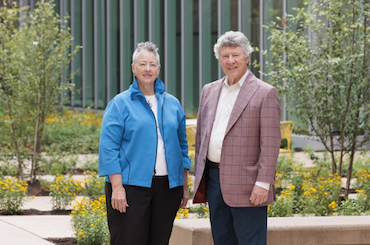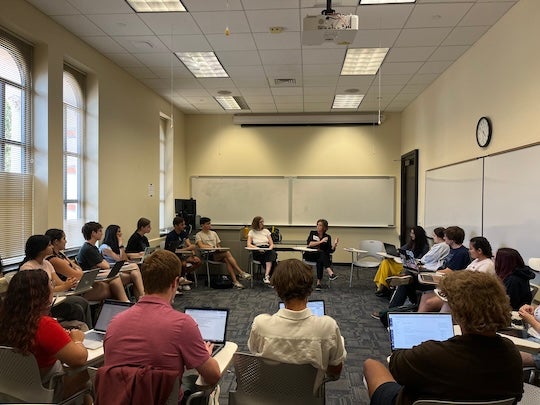At Rice University’s School of Social Sciences, a variety of distinctive political science courses this semester provides students a unique opportunity to explore careers in public service, experience life on the campaign trail and examine the dynamics of the 2024 election.

The three courses go far beyond textbooks, offering future politicians and public servants a sneak peek at the highs, lows and unpredictable twists of the world of American politics.
“In the School of Social Sciences, we believe educating students about public service is a core way to contribute to a well-rounded education,” said Dean Rachel Kimbro. “And there’s no better way to prepare students who are interested in or seeking a career in public service than by offering these kinds of hands-on learning experiences.”
POLI 224: How to Run for Office is a new course taught by Libby Vann, a lecturer in the Department of Political Science. The class more closely resembles a political war room with students spending the semester collaborating on small campaign teams and visiting with election experts, campaign advisers and current and former candidates and elected officials — many of whom are Rice alums hand-picked because of the unique knowledge they can impart on the students.
The major project for the semester requires each team to select an elected office, research its district, craft a candidate biography and campaign materials, calculate a vote goal, identify target voters and design a get-out-the-vote plan. Additionally, students write personal essays reflecting on their own interest in running for public office.
Among the guest speakers are former White House press secretary Josh Earnest ’97, former Harris County Judge Ed Emmett ’71, former Houston Mayor Annise Parker ’78 and Texas State Rep. Ann Johnson, who represents Rice in her legislative district.
The ultimate goal is to enhance students’ knowledge and skills related to voters, campaigns and electoral systems and processes.
“So many of our students come to Rice wanting to take action and make positive change but don’t know how,” Vann said. “I hope this teaches them about the possible pathways to being an agent of change, whether it be running for office or getting behind a candidate you believe in. I hope students come away from the course better understanding the high stakes of political campaigns and elections and how they can impact their lives.”
Freshman Benjamin Kagan described the course as “awesome” and essential for anyone interested in pursuing politics in the future.

“Dr. Vann is an incredible teacher and has already helped me improve my skills in a number of areas,” Kagan said. “She has taught me how to be a better researcher, encouraged me to become further involved with politics and educated me about aspects of the electoral process that 99% of citizens would never realize are involved in the calculus of candidates.”
Junior Celeste Uribe said she took the course because she wanted to not just learn about the political campaign process but be actively involved in it through the class’s campaign project.
“I feel as though there’s a lot of confusion and misinformation surrounding campaign politics despite it being such an integral part of our democratic process,” Uribe said. “Unfortunately, not many people are given the space to learn about and understand the realities of campaign politics, and I strongly feel that this course will not only provide me with the tools needed to better understand the process but also allow me to expand this knowledge outside of the classroom walls.”
SOSC 447: Public Service Practicum is being offered for the first time by Emmett and Parker, two titans of public service. Emmett is currently a fellow in energy and transportation at Rice’s Baker Institute for Public Policy, and he served as Harris County judge from 2007-19 and a Texas state representative from 1979-87. Parker is currently CEO and president of the LGBTQ+ Victory Fund and Leadership Institute, and she served three terms as mayor of Houston from 2010-16. She also spent six years as a Houston City Council member and six years as city controller.
Students enrolled in this course engage in a unique public service internship in either government or the private nonprofit sector. As they engage in public service activities, they also reflect on their individual learning experiences with their classmates each week. The course includes an exploration of the concept of public service through assigned readings and presentations by experts with diverse backgrounds in the field.
“Judge Emmett and I have decades of experience in public office and nonprofit leadership, and we come from the ‘just get it done’ school of politics,” Parker said.
“In today’s world, it is important to understand the positive impact of public servants in both the governmental and private sectors,” Emmett said.

Emmett and Parker also offer in-depth discussions and details on various public service case studies in which they were directly involved. The course features guest speakers who have extensive experience in different areas of public service.
“I’ve really appreciated the exposure to the environment of a nonprofit and its innerworkings and learning about how they all work together,” said sophomore Daijah Wilson. “From this class, I’ve learned that nonprofits are kind of like the hidden piece of public service and government that people don’t talk about, but a lot of the services that people are trying to access would be impossible without the work of nonprofits.”
POLI 238: Election 2024 is taught by John Alford, a professor of political science. The course’s unique focus — the current election cycle — serves as a roadmap for instruction as students follow the weekly twists and turns of the 2024 U.S. election cycle, primarily focusing on the U.S. presidential, House and Senate elections.
The course provides an intriguing look at major research in history and political science, offering insight into the 2024 election and its wider significance. Alford and his students actively participate in the ongoing election by keeping up with developments across various media and sources, which enrich their understanding alongside the course materials.
“This is a highly unusual election and not one to live through without engaging with it,” said Alford. “It is an extraordinary real-life version of a reality/soap opera/drama/cliff-hanger/comedy extended-form streaming series — well worth watching closely, discussing with fellow fans and dissecting as it unfolds. On top of that, it is likely the most critical U.S. election in any of our lifetimes.”

Junior Antonia Bonnis said she took the course because she is passionate about politics.
“As an international student, I am especially curious about American politics and find the elections interesting and very entertaining,” Bonnis said. “The course is great because it keeps us well-informed about all the events during the elections from smaller details to key moments. I really enjoy how we are encouraged to closely follow the elections and use various sources and readings to make educated predictions while understanding the structure of the elections.”
Election day is Nov. 5 with early voting already underway. For more information on course and degree offerings in the School of Social Sciences, visit https://socialsciences.rice.edu.

